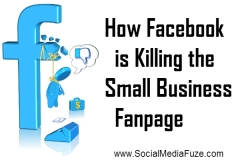In the past 3-4 years more and more businesses have started their own Facebook pages. The problem is that most of these pages are only used for self promotion. Now, it’s only natural for a business wanting to promote itself, but if that’s all you do on your Facebook page, you will quickly find that less and less people are actually seeing your postings.

A lot of people don’t know about this, and more than one person responsible for the Facebook page of their company are scratching their heads in bewilderment as they see the page hit decrease more and more.In fact, on average, only between 1% to 5% of the people who have liked your page will actually see your postings. In an attempt to counter this, a business very often decides to open a competition. This used to be a violation of Facebook’s rules, but since those rules never were enforced, Facebook gave up on them.
The competition usually takes this form: “Please share and like this page/photo/posting and you will have a chance to win one of these ten baskets full of goodies.” And then people start sharing and liking. However, the effect is the complete opposite of what you think: The more you ask people to share and like something, the fewer people will actually see what you post on your page. Why this happens used to be a mystery, but now Facebook has lifted the veil and explained how this algorithm works.
But it makes sense: If people’s news streams became filled with spam (because that’s what these share and like competitions are) people would stop using Facebook. And that would really be bad for business. In addition: People have several hundred “friends” on Facebook and like dozens of Facebook pages. The news stream would be impossible to follow if every single thing that was posted would appear there. That’s why Facebook does a filtering. Now, there are those who feel the users should have more control over this filtering, but that is another debate.
So the next time you see a share and like competition, don’t share it. In addition to annoying other users with spamming (would you run around putting fliers in people’s mail boxes or tell them to go shopping at a this or that store every time you meet them?) you actually decrease traffic and visits for the organisation holding the competition. Instead you should tell the owners of the Facebook page that what they are doing is counter productive.
I’ve been doing social media and business for almost fourteen years now, and several small businesses have asked me lately whether it’s worth it to put up a Facebook page. I tell them that it’s only worth it if the Facebook page will be monitored, and that instead of posting competitions or pure advertisements for their business, they should post and share stuff that people will find useful.
If you run a photo store post tips about photography. Are you running a book store, post links to interviews with authors and reviews of books. Is your business selling sports equipment, post exercising tips. Are you running a toy store, post links to Lego creations or model train shows. I think you get the idea.
And if you manage to get a debate going, where a lot of people participate, the chances of your postings appearing in most of your followers news stream are much bigger. Take the web page io9.com for example. They always get a good debate going in their postings, and I often participate or click on them. The result? Most of their postings end up in my stream. The same with Classic Rock Magazine’s Facebook page. On the other end of the scale is a local store who continue to post endless “share and like” postings. They never ever appear in my news stream. And the owner of the page complained to me last night that nobody visited her posts any more. I then told her why. Also: Let customers ask you questions and answer them, and give them good advice.
The conclusion is that instead of promoting your business with share and like competitions and the sale of the week, you should give your followers useful and interesting content. And the next time you see such a competition, don’t share it, ok?